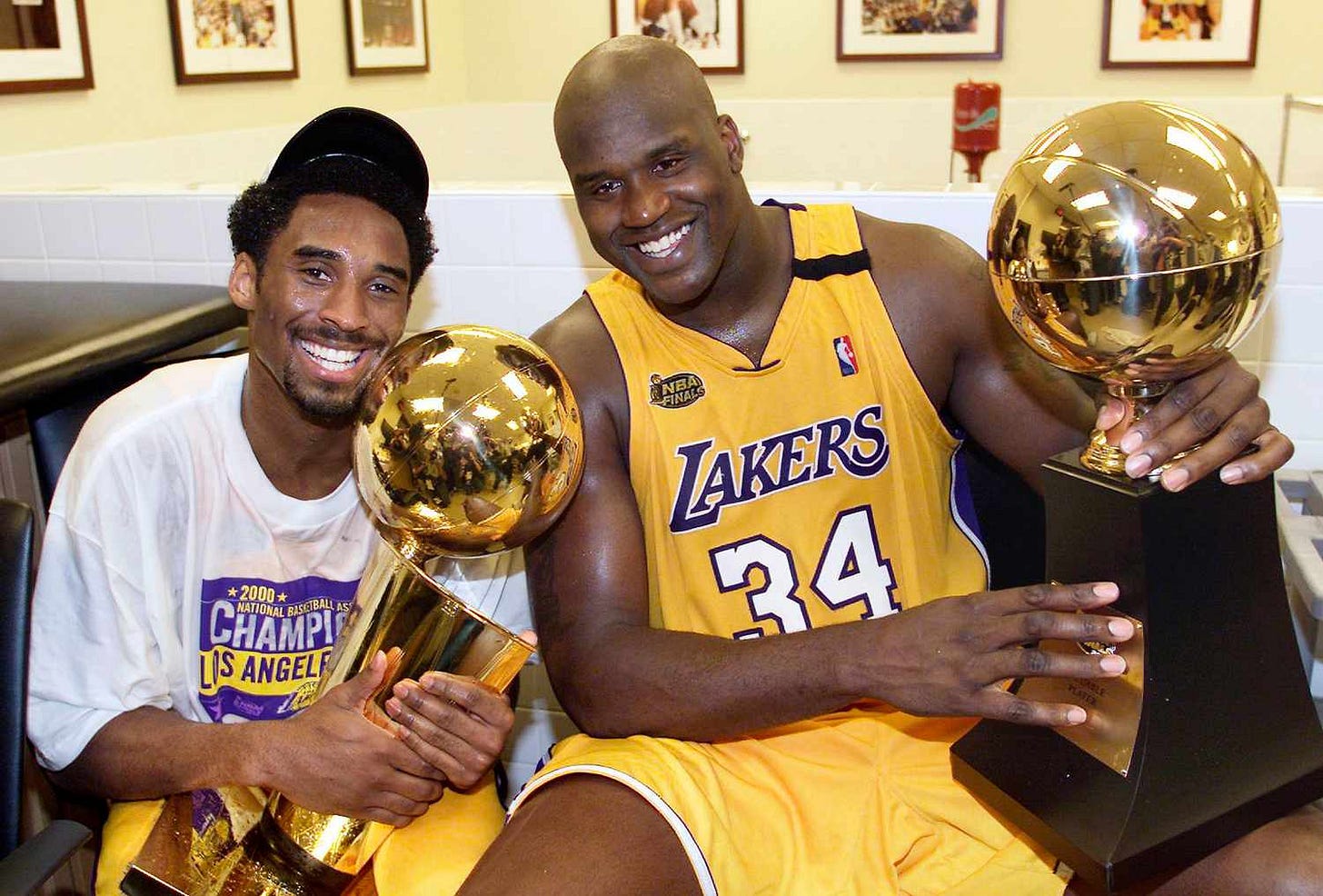Legendary NBA Rivalries: A Decade-by-Decade Journey (2000s)
Shaq and Kobe!
San Antonio Spurs vs. Los Angeles Lakers
The early 2000s rivalry between the San Antonio Spurs and Los Angeles Lakers featured battles for dominance in the Western Conference, with numerous playoff encounters. Tim Duncan's Spurs and the Kobe Bryant-Shaquille O'Neal-led Lakers traded championships throughout the decade. These two franchises combined to appear in seven straight NPA Finals from 1999-2005. Their rivalry was marked by contrasting styles; the Spurs' disciplined, team-oriented approach vs. the Lakers' star-driven spectacle. These duels often determined the NBA champion.
Key Players
Los Angeles Lakers
Kobe Bryant: A dynamic scorer, clutch performer, and fierce competitor, Bryant was central to the Lakers’ success during this era. The 5-time NBA champ,18-time All-Star, and 12-time member of the All-Defensive Team is the all-time leading scorer in Lakers history, and one of the greatest to ever play the game. For my money, the Black Mamba is the closest there was to the talent, mentality, style of play, and championship pedigree of MJ.
Career Averages: 25.0 PPG, 5.3 RPG, 4.7 APG, 1.4 SPG
Best Statistical Season (2005-2006, MVP – 4th): 35.4 PPG, 5.3 RPG, 4.5 APG, 1.8 SPG)
Modern Fantasy Comparison: James Harden
· Both Harden and Bryant provide elite scoring while providing above-average output for rebounds, assists, and steals.
Shaquille O’Neal: Dominating the paint, Shaq was a powerful force whose physical presence and scoring ability were pivotal in the Lakers' championship runs. The 15-time All-Star and 3-time Finals MVP is one of three players to win NBA MVP, All-Star MVP and Finals MVP in the same year (2000).
Career Averages: 23.7 PPG, 10.9 RPG, 2.5 APG, 2.3 BPG
Best Statistical Season (1999-2000, MVP): 29.7 PPG, 13.6 RPG, 3.8 APG, 3.0 BPG
Modern Fantasy Comparison: Joel Embiid
· I’ve used the Embiid comparison for others in this series. Although O’Neal produced more assists and blocks, the two greats put up very similar averages in points and rebounds.
San Antonio Spurs
Tim Duncan: Known as “The Big Fundamental,” Duncan’s consistent excellence, defensive impact, and leadership formed the backbone of the Spurs’ success. He is widely considered the greatest power forward of all time.
Career Averages: 19.0 PPG, 10.8 RPG, 3.0 APG, 2.2 BPG
Best Statistical Season (2001-2002, MVP): 25.5 PPG, 12.7 RPG, 3.7 APG, 2.5 BPG
Modern Fantasy Comparison: Anthony Davis
· Across each category, the statistical output of Duncan and Davis were closely aligned.
Tony Parker: The French-American was an integral part of four NBA championships in 2003, 2005, 2007, and 2014.
Career Averages: 15.5 PPG, 2.7 RPG, 5.6 APG
Best Statistical Season (2008-2009, MVP – 8th): 22.0 PPG, 3.1 RPG, 6.9 APG
Modern Fantasy Comparison: Jrue Holiday
· Holiday and Parker have similar statistical output in both career averages and peak production.
Manu Ginóbili: An integral part of the Spurs’ backcourt, Manu brought creativity, speed, and tenacity to complement Duncan’s inside presence. The four-time NBA champion, also has a EuroLeague championship and Olympic gold medal under his belt.
Career Averages: 13.3 PPG, 3.5 RPG, 3.8 APG, 1.3 SPG
Best Statistical Season (2007-2008, 6MOY): 19.5 PPG, 4.8 RPG, 4.5 APG, 1.5 SPG
Modern Fantasy Comparison: Khris Middleton
· Having similar career averages and peak production, both Middleton and Ginóbili were known for their basketball IQ and versatility.
Dynamics and Competitive Nature
The rivalry was marked by their repeated battles in the Western Conference, where both teams often stood in each other’s path to NBA Finals appearances.
The Lakers were known for their star power and the “Dynasty” era under coach Phil Jackson, the team’s success often revolved around the dominant duo of Shaq and Kobe.
The Spurs were coached by Gregg Popovich, were renowned for their disciplined, defensive-minded play, and team-oriented approach emphasizing ball movement and efficiency.
Notable Encounters
2001 Western Conference Finals: The Lakers swept the Spurs in a dominant series, showcasing Shaq and Kobe’s synergy and establishing their supremacy in the West. The Lakers breezed through the 4-game series, winning each game by an average of 22 points.
2003 Western Conference Semifinals: The Spurs defeated the Lakers in six games, marking a significant moment that ended LA’s run of three consecutive championships. Tim Duncan’s MVP-caliber performances highlighted the Spurs' rising dominance.
2004 Western Conference Semifinals: Despite falling in an 0-2 hole, the Lakers bounced back to eliminate the Spurs in six games, featuring Derek Fisher’s legendary “0.4 seconds” shot to win the pivotal fifth game, a dramatic buzzer-beater that is remembered as one of the greatest clutch plays in playoff history.
2008 Western Conference Finals: Reigniting their rivalry, the Lakers defeated the Spurs in five games, paving the way for Kobe Bryant to secure an NBA Finals appearance and the team’s resurgence as a championship contender.
Legacy and Influence
The Lakers vs. Spurs rivalry of the 2000s was a pivotal force in shaping the landscape of the NBA, influencing both teams' legacies with a blend of competition and mutual respect.
For the Lakers, this period underlined their ability to regenerate with top-tier talent and coaching, with Kobe Bryant emerging as a legend through these competitive encounters.
For the Spurs, it highlighted the success of their system-driven approach, enduring resilience, and ability to challenge some of the game’s most dominant players.
This rivalry exemplified the contrast of star power against teamwork, and style against strategy, contributing to unforgettable playoff moments and battles that defined a generation of basketball. It showcased the enduring excellence and adaptability of two of the NBA’s most successful franchises.
John Fritz - Bleav in Fantasy
Follow on👉Substack
👉LEAVE US A REVIEW ON APPLE PODCASTS
👉SUBSCRIBE TO OUR YOUTUBE CHANNEL
Robbin Marx
NBA Fantasy Analyst
Experience: NBC Sports - Rotoworld, HashTag Basketball, Bleav Network




